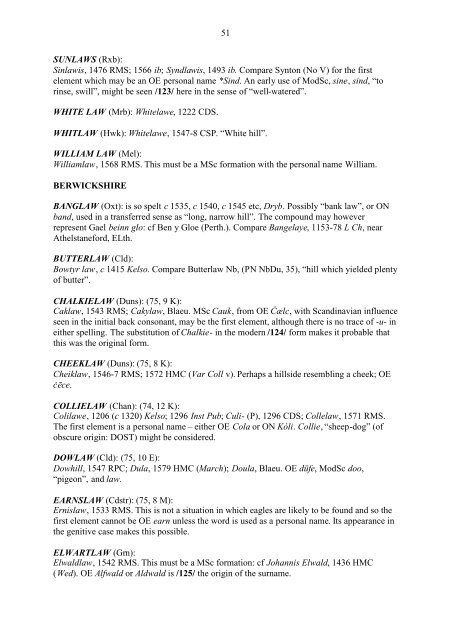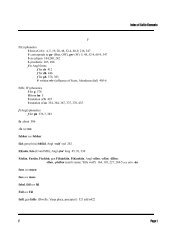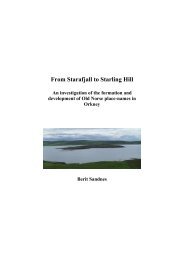May Williamson: The Non-Celtic Place-Names of the Scottish Border ...
May Williamson: The Non-Celtic Place-Names of the Scottish Border ...
May Williamson: The Non-Celtic Place-Names of the Scottish Border ...
You also want an ePaper? Increase the reach of your titles
YUMPU automatically turns print PDFs into web optimized ePapers that Google loves.
51<br />
SUNLAWS (Rxb):<br />
Sinlawis, 1476 RMS; 1566 ib; Syndlawis, 1493 ib. Compare Synton (No V) for <strong>the</strong> first<br />
element which may be an OE personal name *Sind. An early use <strong>of</strong> ModSc, sine, sind, “to<br />
rinse, swill”, might be seen /123/ here in <strong>the</strong> sense <strong>of</strong> “well-watered”.<br />
WHITE LAW (Mrb): Whitelawe, 1222 CDS.<br />
WHITLAW (Hwk): Whitelawe, 1547-8 CSP. “White hill”.<br />
WILLIAM LAW (Mel):<br />
Williamlaw, 1568 RMS. This must be a MSc formation with <strong>the</strong> personal name William.<br />
BERWICKSHIRE<br />
BANGLAW (Oxt): is so spelt c 1535, c 1540, c 1545 etc, Dryb. Possibly “bank law”, or ON<br />
band, used in a transferred sense as “long, narrow hill”. <strong>The</strong> compound may however<br />
represent Gael beinn glo: cf Ben y Gloe (Perth.). Compare Bangelaye, 1153-78 L Ch, near<br />
A<strong>the</strong>lstaneford, ELth.<br />
BUTTERLAW (Cld):<br />
Bowtyr law, c 1415 Kelso. Compare Butterlaw Nb, (PN NbDu, 35), “hill which yielded plenty<br />
<strong>of</strong> butter”.<br />
CHALKIELAW (Duns): (75, 9 K):<br />
Caklaw, 1543 RMS; Cakylaw, Blaeu. MSc Cauk, from OE Ċælc, with Scandinavian influence<br />
seen in <strong>the</strong> initial back consonant, may be <strong>the</strong> first element, although <strong>the</strong>re is no trace <strong>of</strong> -u- in<br />
ei<strong>the</strong>r spelling. <strong>The</strong> substitution <strong>of</strong> Chalkie- in <strong>the</strong> modern /124/ form makes it probable that<br />
this was <strong>the</strong> original form.<br />
CHEEKLAW (Duns): (75, 8 K):<br />
Cheiklaw, 1546-7 RMS; 1572 HMC (Var Coll v). Perhaps a hillside resembling a cheek; OE<br />
ċēce.<br />
COLLIELAW (Chan): (74, 12 K):<br />
Colilawe, 1206 (c 1320) Kelso; 1296 Inst Pub; Culi- (P), 1296 CDS; Collelaw, 1571 RMS.<br />
<strong>The</strong> first element is a personal name – ei<strong>the</strong>r OE Cola or ON Kóli. Collie, “sheep-dog” (<strong>of</strong><br />
obscure origin: DOST) might be considered.<br />
DOWLAW (Cld): (75, 10 E):<br />
Dowhill, 1547 RPC; Dula, 1579 HMC (March); Doula, Blaeu. OE dūfe, ModSc doo,<br />
“pigeon”, and law.<br />
EARNSLAW (Cdstr): (75, 8 M):<br />
Ernislaw, 1533 RMS. This is not a situation in which eagles are likely to be found and so <strong>the</strong><br />
first element cannot be OE earn unless <strong>the</strong> word is used as a personal name. Its appearance in<br />
<strong>the</strong> genitive case makes this possible.<br />
ELWARTLAW (Grn):<br />
Elwaldlaw, 1542 RMS. This must be a MSc formation: cf Johannis Elwald, 1436 HMC<br />
(Wed). OE Alfwald or Aldwald is /125/ <strong>the</strong> origin <strong>of</strong> <strong>the</strong> surname.




